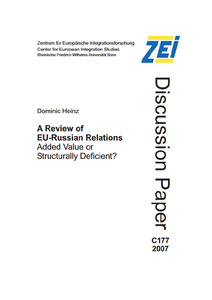Heinz, Dominic: A review of EU-Russian relations : Added value or structurally deficient?. Bonn: Zentrum für Europäische Integrationsforschung (ZEI), 2007. In: ZEI Discussion Paper, C177.
Online-Ausgabe in bonndoc: https://hdl.handle.net/20.500.11811/10094
Online-Ausgabe in bonndoc: https://hdl.handle.net/20.500.11811/10094
@techreport{handle:20.500.11811/10094,
author = {{Dominic Heinz}},
title = {A review of EU-Russian relations : Added value or structurally deficient?},
publisher = {Zentrum für Europäische Integrationsforschung (ZEI)},
year = 2007,
series = {ZEI Discussion Paper},
volume = C177,
note = {The dissolution of the Soviet Union (SU) marked the end of the way the international political system had been organized since 1945. New states emerged and the foreign policies of the European states and Russia had to be readjusted. Since one of the hitherto existing two superpowers collapsed, the remaining superpower was by default predominant in the international system. In the Western hemisphere, the dominant position of the United States (US) had been unchallenged during the Cold War and remained unchallenged after the Cold War. After the dissolution of the SU and after the conclusion of the Maastricht Treaty, Russia and the EU developed several institutions and policies (f. i. the Partnership and Cooperation Agreement which will be discussed later in detail) to express their foreign policy positions. These institutions and policies are analysed as endogenous issues in the first part of the paper for the EU and in the second part for Russia. However, they evolved and changed in the process of finding solutions for international conflicts and crises that forced the EU and Russia to cooperate. These conflicts and crises are analysed as exogenous issues to EU-Russian relations in the third part of the paper.},
url = {https://hdl.handle.net/20.500.11811/10094}
}
author = {{Dominic Heinz}},
title = {A review of EU-Russian relations : Added value or structurally deficient?},
publisher = {Zentrum für Europäische Integrationsforschung (ZEI)},
year = 2007,
series = {ZEI Discussion Paper},
volume = C177,
note = {The dissolution of the Soviet Union (SU) marked the end of the way the international political system had been organized since 1945. New states emerged and the foreign policies of the European states and Russia had to be readjusted. Since one of the hitherto existing two superpowers collapsed, the remaining superpower was by default predominant in the international system. In the Western hemisphere, the dominant position of the United States (US) had been unchallenged during the Cold War and remained unchallenged after the Cold War. After the dissolution of the SU and after the conclusion of the Maastricht Treaty, Russia and the EU developed several institutions and policies (f. i. the Partnership and Cooperation Agreement which will be discussed later in detail) to express their foreign policy positions. These institutions and policies are analysed as endogenous issues in the first part of the paper for the EU and in the second part for Russia. However, they evolved and changed in the process of finding solutions for international conflicts and crises that forced the EU and Russia to cooperate. These conflicts and crises are analysed as exogenous issues to EU-Russian relations in the third part of the paper.},
url = {https://hdl.handle.net/20.500.11811/10094}
}






